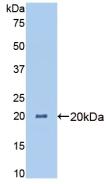Polyclonal Antibody to Angiopoietin Like Protein 4 (ANGPTL4) 

ARP4; FIAF; HFARP; NL2; PGAR; Pp1158; Fasting-Induced Adipose Factor; Hepatic Angiopoietin-Related Protein; Hepatic Fibrinogen/Angiopoietin-Related Protein
- UOM
- FOB US$ 120.00 US$ 280.00 US$ 400.00 US$ 1,000.00 US$ 4,000.00
- Quantity
Overview
Properties
- Product No.PAB019Po01
- Organism SpeciesSus scrofa; Porcine (Pig) Same name, Different species.
- ApplicationsWB; IHC; ICC; IP.
If the antibody is used in flow cytometry, please check FCM antibodies.
Research use only - DownloadInstruction Manual
- CategoryTumor immunityEndocrinologyHormone metabolism
- SourcePolyclonal antibody preparation, Host Rabbit
- Ig Type IgG, Potency n/a
- PurificationAntigen-specific affinity chromatography followed by Protein A affinity chromatography
- LabelNone
- Immunogen RPB019Po01-Recombinant Angiopoietin Like Protein 4 (ANGPTL4)
- Buffer FormulationPBS, pH7.4, containing 0.02% NaN3, 50% glycerol.
- TraitsLiquid, Concentration 500µg/mL
Sign into your account
Share a new citation as an author
Upload your experimental result
Review

Contact us
Please fill in the blank.
Specifity
The antibody is a rabbit polyclonal antibody raised against ANGPTL4. It has been selected for its ability to recognize ANGPTL4 in immunohistochemical staining and western blotting.
Usage
Western blotting: 0.5-2ug/ml
Immunocytochemistry in formalin fixed cells: 5-20ug/ml
Immunohistochemistry in formalin fixed frozen section: 5-20ug/ml
Immunohistochemistry in paraffin section: 5-20ug/ml
Enzyme-linked Immunosorbent Assay: 0.05-2ug/ml
Optimal working dilutions must be determined by end user.
Storage
Store at 4°C for frequent use. Stored at -20°C in a manual defrost freezer for two year without detectable loss of activity. Avoid repeated freeze-thaw cycles.
Stability
The thermal stability is described by the loss rate. The loss rate was determined by accelerated thermal degradation test, that is, incubate the protein at 37°C for 48h, and no obvious degradation and precipitation were observed. The loss rate is less than 5% within the expiration date under appropriate storage condition.
Giveaways
Increment services
-
 Antibody Labeling Customized Service
Antibody Labeling Customized Service
-
 Protein A/G Purification Column
Protein A/G Purification Column
-
 Staining Solution for Cells and Tissue
Staining Solution for Cells and Tissue
-
 Positive Control for Antibody
Positive Control for Antibody
-
 Tissue/Sections Customized Service
Tissue/Sections Customized Service
-
 Phosphorylated Antibody Customized Service
Phosphorylated Antibody Customized Service
-
 Western Blot (WB) Experiment Service
Western Blot (WB) Experiment Service
-
 Immunohistochemistry (IHC) Experiment Service
Immunohistochemistry (IHC) Experiment Service
-
 Immunocytochemistry (ICC) Experiment Service
Immunocytochemistry (ICC) Experiment Service
-
 Flow Cytometry (FCM) Experiment Service
Flow Cytometry (FCM) Experiment Service
-
 Immunoprecipitation (IP) Experiment Service
Immunoprecipitation (IP) Experiment Service
-
 Immunofluorescence (IF) Experiment Service
Immunofluorescence (IF) Experiment Service
-
 Buffer
Buffer
-
 DAB Chromogen Kit
DAB Chromogen Kit
-
 SABC Kit
SABC Kit
-
 Long-arm Biotin Labeling Kit
Long-arm Biotin Labeling Kit
-
 Real Time PCR Experimental Service
Real Time PCR Experimental Service
Citations
- Angiopoietin-like 4 (Angptl4) Protein Is a Physiological Mediator of Intracellular Lipolysis in Murine AdipocytesPubMed: PMC3318686
- Decreased Concentrations of the Lipoprotein Lipase Inhibitor Angiopoietin-Like Protein 4 and Increased Serum Triacylglycerol Are Associated With Increased Neonatal Fat Mass in Pregnant Women With Gestational Diabetes Mellitus Pubmed: 23744407
- Lack of Relationship between Cord Serum Angiopoietin-Like Protein 4 (ANGPTL4) and Lipolytic Activity in Human Neonates Born by Spontaneous DeliveryPubmed: 24324678
- Angptl4 is upregulated under inflammatory conditions in the bone marrow of mice, expands myeloid progenitors, and accelerates reconstitution of platelets after myelosuppressive therapyPubMed: 26054961
- Examination of angiopoietin-like protein 4, neuropeptide Y, omentin-1 levels of obese and non-obese patients with polycystic ovary syndromePubMed: 26291814
- Interaction of Gut Microbiota and High‐sodium, Low‐potassium Diet in Altering Plasma Triglyceride Profiles Revealed by Lipidomics AnalysisPubmed: 31675161
- Analysis of novel serum markers of fibrosis and angiogenesis in patients with alcoholic liver cirrhosis
- Di (2-ethylhexyl) phthalate exposure exacerbates metabolic disorders in diet-induced obese mice34303773






